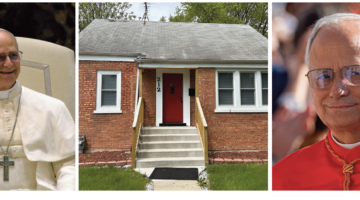 By the time the women took their places on stage, audience anticipation for their organic a cappella renderings had reached a fevered, if slightly subdued, pitch.
By the time the women took their places on stage, audience anticipation for their organic a cappella renderings had reached a fevered, if slightly subdued, pitch.
When Sweet Honey in the Rock began harmonizing and storytelling nearly 30 minutes after the scheduled time, the group quickly lured a patient crowd under their spell with a show that was at times educational, often entertaining, and always inspirational.
Although none of the women possesses powerhouse vocals, their voices together create a uniquely beautiful sound encompassing clear, pitch-perfect melodies with substantive, socially relevant lyrics. Adding to their earthy sound are several hand-held instruments such as the shakere, a handheld African percussion device, as well as rhythm sticks and egg shakers.
The six-member group, referred to as “a national treasure” by First Lady Michelle Obama, performed to a nearly sold-out crowd on Dec. 12 at the Adrienne Arsht Center for the Performing Arts of Miami-Dade County.
Aisha Kahlil, her sister, Nitanju Bolande Casel, Carol Maillard, Louise Robinson, Ysaye M. Barnwell and Shirley Childress Saxton comprise the group. Saxton provides sign language interpretations of the group’s performances.
The a cappella ensemble was founded in 1973 at the D.C. Black Repertory Theater Company, and has been wowing audiences the world over with a repertoire founded in spiritual and gospel music (there is a difference); and includes the rich, empowering messages of the civil rights movement, plus entreaties for people to respect each other and Mother Earth.
Indeed, one of the selections performed by the Grammy-nominated ensemble celebrated the sacrifices made by Floridian Harry T. Moore.
As the organizer of Florida’s NAACP during the late 1940s, Moore was responsible for registering more blacks to vote in the state than in all other southern states combined. He and his wife, Harriett, were killed in their home on Christmas Day in 1951 by a bomb planted on Christmas Eve.
“No bomb can kill the dreams I hold for freedom never dies,” are some of the lyrics to “Freedom Never Dies,” that are made even more poignant because of who wrote them, poet and author Langston Hughes.
Local spoken word artist Rebecca “Butterfly” Vaughns, also attended.
“Like is an understatement,” she said when asked to share her feelings about the performance.
“I’m still on cloud nine,” she said of the show that found her “making sounds and beats on her thighs” in concert with the group’s rhythms. “I’ve always viewed a cappella as true talent,” she said, because of artists’ inability to hide behind the music.
While steeped solidly in the African-American experience, the content of the group’s selections evoked strong spirituality, as well as environmentally conscious sentiments from members of the audience.
The group sang of a West African woman’s challenges to have a child after difficulty conceiving. Once the child is born, the song says, the family realizes that the prayers cannot stop because the child deserves a fulfilling life.
Another selection encouraged the young and “young at heart” to “listen to the still small voice [within]…and do what the spirit say.”
In differentiating between a “spiritual” and “gospel music,” Barnwell explained that spirituals represent a vast body of songs created by Africans with a number of themes, including life and death, and are inclusive of remnants of other religions, such as Buddhism and Islam.
Gospel music, she explained, is a “20th century phenomenon that is an evolution from blues and jazz.” Of gospel’s ever-evolving format, she said, “every generation brings their secular sound into the sacred setting.”
My 16-year-old daughter accompanied me to the show. Her reactions ranged from hand-clapping and joyous smiles, to grabbing a quick snooze, to brief snickering when Kahlil launched into unanticipated earthy howls at the beginning of “The Soul of Nature,” a song of praise for Mother Earth.
While not blown away by the individual vocals, I was thoroughly entertained by Sweet Honey’s beautifully engaging stage presence. I enjoyed their smooth, almost effortless harmonies and their authentic renderings of rich African folklore, along with the profound, often ignored philosophies of this country’s civil rights movement, through song and storytelling.
RMHarris15@Aol.com
Photo: Sweet Honey in the Rock












No Comment